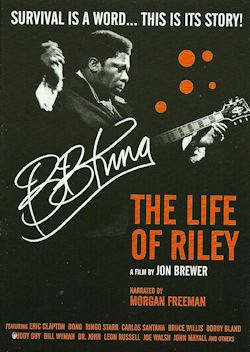This film by Jon Brewer traces the life of singing guitarist B. B. King. The film is narrated by Morgan Freeman and it is called
The Life of Riley
because BB’s name is actually Riley B. King. The DVD follows his life from his birth in 1925 as part of a poor family, via his work on a Mississippi
plantation to his first taste of fame which arose when he got work for radio stations in Memphis. His early musical experience included singing with gospel
groups and playing the guitar on street corners. As a guitarist, he wanted to imitate Bukka White’s slide sound, but he could only do this by developing
his own trademark vibrato. This helped to make him a pioneer of electric blues: an urban sound which was somewhat different from the country blues with
which King started. The film also underlines the harsh effect of racial prejudice and segregation. When he saw a black man hanged by a white mob, King said
“That’s something I’ve never forgotten”.
BB was basically a bluesman, but his playing also owed a lot to jazz, as you can hear in such recordings as Newport in New York, the 1972 album in
which King played alongside jazz musicians and made a definite impression. This is no surprise, as BB said that he was influenced by such jazz guitarists
as Charlie Christian and Django Reinhardt.
The film contains many tributes to King from fellow musicians, including Carlos Santana, Leon Russell and Dr John. Song-writing guitarist Derek Trucks
makes the point that BB could play one note and then leave a gap which would be more eloquent than the playing of other guitarists. Many appreciative
comments come from British musicians, and the film underlines the fact that British enthusiasm for King led to him gaining a much wider appeal. He toured
with the Rolling Stones in 1969, and later with U2. The “extras” on the DVD include extracts from his 2011 concert at London’s Albert Hall, where the
British crowd’s admiration is tangible. A wider audience was also assured by King’s recording of The Thrill is Gone, to which the producer added
strings: an unprecedented feature on a blues record.
In fact the appreciative contributions from numerous admirers occupy rather too much of this two-hour disc. It would have been nice to see more of BB in
action, playing whole numbers instead of just fragments. But the film usefully covers several aspects of King, such as his generous spirit and his tireless
workload. It was only when he reached the age of 70 that he declared he would reduce his touring from 300 to 200 gigs a year! King is now in his late
eighties but still performing. He has every right to the title “King of the Blues”, but he is also a significant figure in the story of the jazz guitar.
Tony Augarde
www.augardebooks.co.uk
